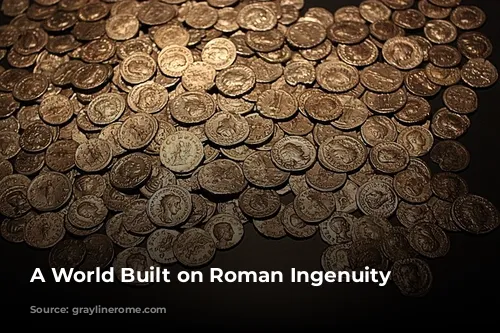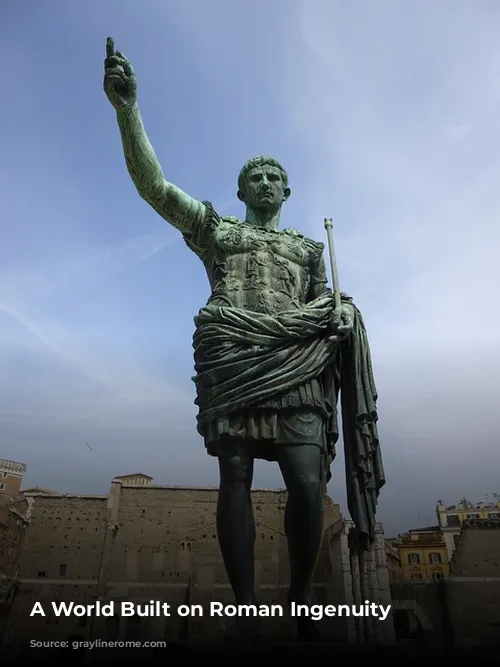The Roman Empire left an indelible mark on the world, and its legacy continues to shape our lives today. Many of the conveniences we take for granted, from our roads to our legal systems, owe their origins to the ingenuity of the Romans. Let’s delve into ten of the most impactful inventions that the Roman Empire bestowed upon the world.

From Humble Beginnings to Majestic Structures
Imagine strolling through Rome and witnessing the awe-inspiring ancient structures that still stand tall. The Pantheon, the Colosseum, and the Roman Forum are testaments to the Roman Empire’s architectural prowess. The Romans employed a rudimentary form of cement to construct these majestic buildings. While not the same as the cement we use today, it was a remarkable innovation that played a pivotal role in shaping their architectural achievements.
Taming the Waters: The Aqueduct’s Power
The concept of transporting water wasn’t entirely new, as primitive canals and water systems existed prior to the Roman Empire. However, the Romans refined and perfected this concept, culminating in the creation of the aqueduct. This ingenious invention brought clean water into bustling towns and cities, revolutionizing sanitation and contributing to the development of public health.
A Legacy of Sanitation: Keeping Cities Clean
The Romans harnessed the power of their aqueducts to not only bring clean water into urban centers but also to implement a sophisticated sanitation system. They developed sewers to effectively remove waste from cities, ensuring a healthier living environment. Their commitment to hygiene is evident in the detailed sewerage systems that connected many Roman homes, making a remarkable contribution to public health.
Connecting an Empire: Roads and Highways
The Roman Empire was a vast and sprawling entity, and efficient transportation was paramount. To manage this colossal realm, the Romans developed an intricate network of roads and highways spanning 55,000 miles across Europe and the Mediterranean. This infrastructure facilitated the movement of supplies, soldiers, and communication, making it possible to efficiently administer their empire.
A Legacy of Justice: Shaping Modern Law
The Roman legal system laid the foundation for many modern legal systems around the world. They introduced the principle of “innocent until proven guilty,” a fundamental tenet of justice systems today. The Romans also created a set of laws known as “the twelve tables,” which outlined punishments for various crimes. Many legal terms, such as “pro bono,” “subpoena,” and “affidavit,” have their roots in Roman legal tradition.
The Dawn of Public Communication: Sharing the News
The Romans were pioneers in disseminating news to their citizens. Handwritten announcements, known as “Acta Diurna,” were publicly displayed in Rome, keeping the population informed about political developments, military updates, and major scandals. Julius Caesar was instrumental in ensuring that this information was made public, laying the groundwork for the concept of daily news.
Innovation in Medicine: Advancements in Surgery
The Romans built upon the surgical advancements made by the Greeks. They developed numerous new surgical tools and techniques and recognized the importance of using antiseptics to clean their instruments. The concept of the caesarean section originated during this period, and the Romans also excelled in battlefield surgery, recognizing its importance in maintaining their military strength.
Timekeeping: The Julian Calendar
The Romans created the Julian calendar, a system based on the solar year and comprising 365 days divided into 12 months. This calendar, named after Julius Caesar, is still used by some religious bodies today to calculate holidays.
A Network of Communication: Connecting the Empire
The vast expanse of the Roman Empire demanded efficient communication. Emperor Augustus established the first postal and courier service, a state-run network that facilitated the swift delivery of messages across the empire. This innovative service ensured effective communication between officials and contributed to the smooth functioning of the empire.
The Enduring Legacy of Rome
The Roman Empire’s legacy extends far beyond its grand structures and impressive military conquests. Their inventions and innovations have left a profound mark on our modern world. The next time you use a road, benefit from a legal system, or read a newspaper, remember the ingenuity of the Romans who laid the foundation for these fundamental aspects of our lives.
Explore the wonders of Ancient Rome with Gray Line I Love Rome! Discover the fascinating history and enduring legacy of the Roman Empire by visiting Rome and experiencing its captivating sights firsthand. Visit the Gray Line I Love Rome website for more information on how to explore this incredible city. You can also follow Gray Line I Love Rome on Facebook, Twitter, and Instagram for updates on the many sights and experiences they offer.
